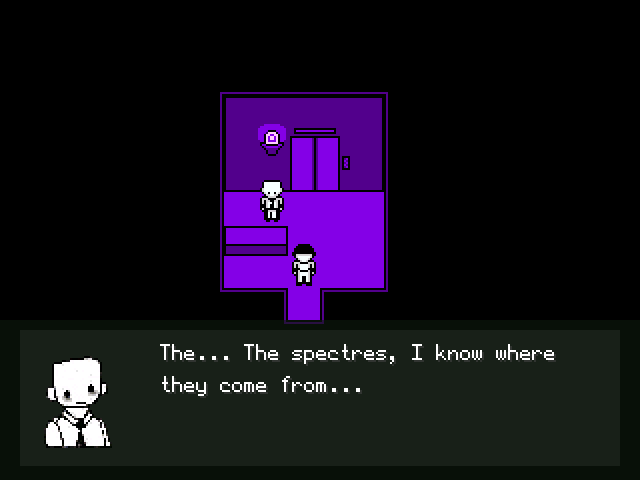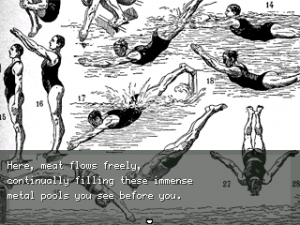Sharing the Burden

I remember my roommate was making funny looks.
“What’s up?” I asked.
“Trying to play this game,” she answered. “I found it on Tumblr.”
“What game?”
“Off.”
Originally the appeal was in the art style, she told me, which was a combination of monochrome, awkward characters and bright backgrounds, along with old-fashioned RPG elements. She had found the art all over Tumblr for a free, indie French game from 2007 that had recently been translated into English called Off. It was intriguing enough just by appearances to try it out, so I downloaded it too.
When I initially went to find the game, it was more difficult to find thanks to its simple title and lack of proper distribution, although nowadays you can Google it pretty easily. It was an art project created by a developer who online goes by Mortis Ghost. Despite this, its imprint is everywhere — from fan art, to comics, to blog posts trying to interpret the game’s tragic undertones and ending, to fanzines. There are even novelty accounts on Tumblr where fans roleplay the characters and have people ask them questions. Cosplays are very common, and my local anime convention was swarming with them. Not since Slender have I seen a free indie game take on a life of its own seemingly so quickly.
After I heard “Somewhere Over the Rainbow” and the credits rolled, I saw why the game spread as quickly as it did, although in a way I wish I hadn’t. The ending left me with so many questions and so many emotions that I was not prepared for. I loved it, yet hated it for what it did. I needed to get other people to play it.
“Who is this kid and why does he keep losing his pets?” my friend asked.
One of a billion questions that are spouted while playing Off. It’s been a couple of months since I’ve played it for the first time and since then it has caught on. Friends and I are all looking on as we watch another one of us experience it: getting sucked in to the confusion and the discomfort. “Just keep playing.”
It’s not that the game is difficult to get through. It’s just that you feel a lot of apprehension from the start. Your character, identified as the Batter, enters a room where a cat that calls himself the Judge greets you. Actually, he doesn’t greet the Batter. He welcomes you, the player, by asking your name, which he then uses to address the person behind the Batter. He calls you the puppet master and the Batter, your puppet, is on a quest to “purify” the world of specters. Does that mean it’s your quest? What exactly is your role and why do you feel so uneasy about letting the Batter do as he pleases?
Games tend to put the players in the mind of the character. These characters act as our avatar in the world we now inhabit and take all of the punishments and consequences of our actions. While this kind of immersion can create empathy through conflict and interaction, we’re still dissonant. Because we are within the character, we are not accountable for anything that happens. We can walk away after we’re done.
However, when a game makes you a character, you can’t escape. When the Judge looks at you and says your name, you hesitantly look around. The game is watching you and observing how you control the Batter.
In Off, you are the hand of God and unbeknownst to you, your hands will be stained. You can’t just leave.
When the Internet has questions, it goes back to the Internet.
In the days following our first playthroughs, my roommate and I had a lot of questions. The game is obtuse and vague on purpose, presenting the player with speculation regarding the world, the characters, and the dialogue. Much of the dialogue is riddles meant to confuse the player and make the world seem more mysterious and unfamiliar. The deeper you go into the story, the more it pulls away. As events occur, things you thought you knew turn out to be not true and things that you were questioning are never answered. This only works to pull you in more and you continue to be entranced.
Games like Off are fun because they aren’t straightforward. You can play through it multiple times and still never feel like you understand it completely. At its most literal interpretation, the game is a post-apocalyptic tragedy. The Internet has opened the floor to other theories, such as it all being a dream inside one of the character’s heads. Whether certain characters exist is up for debate. People have torn this game apart looking for answers.
My roommate and I craved discussion. Any media that bombards you with so many riddles is bound to warrant it. Abstraction is both the enemy of the mind and a blessing.
“I need someone to talk to,” was a common mantra in our house for weeks.
We took to the Internet first, to the spoiler zones where everyone was in the same boat. When we ran out of places on the Internet to go, we decided to recruit some friends in order to gather more opinions. We started with our other roommates by talking about theories in the open (without spoilers, of course). It wasn’t on purpose, but it was something that was just constantly on our minds. Then it spread to other friends, half of it being that we just wouldn’t shut up about it.
Even people in my office were playing it during lunch breaks. It was an epidemic.
A major symptom is saying: “You’ve played Off? Good! So about this ending. I have a lot of feelings.”
“Everything is very serial-killery,” my friend continued.
“What do you mean?”
“Well you’re killing these bosses, dead children, and there’s a queen that keeps killing off her subjects.”
We all stare at each other, wink, and chuckle. This is one of our last friends to get around to the game. He’s a bit behind, but he’s had enough time to try and guess why we’ve been so secretive about the true ending. It’s kind of a huge draw.
“Why is everyone doomed?” he asks in regards to a statement made by the third boss.
“What is the Room?”
“Have I just been leading a genocide?”
“No,” I said. “You’re just purifying things.”
“No, something’s wrong.”
The game took about 10 hours to beat (although both my roommate and I got lost multiple times), and afterwards we were both longing for someone to talk to. We craved company in order to dissect it, understand it, and impart its story onto others. Most of all, we wanted others to suffer.
We may be horrible people, but we know how it feels to get to the end, after playing through the various worlds, and realize that everything you thought you knew was wrong.
“What is the Room?”
“You’ll see.”
“What’s in there?”
Another common statement that you hear when people play Off is “oh no” repeated over and over again.
The appeal of Off isn’t just in its slightly off-kilter atmosphere or its unique art design. It’s in the ending. It’s the realization that you haven’t been pulling off some kind of righteous quest.
 There comes a moment in some video games where something goes wrong. The gameplay starts to unravel and story elements stop making sense thanks to a sudden shift. It’s like you’ve traveled into a different game. Sometimes you wish you were in a different game so you wouldn’t have to deal with the consequences.
There comes a moment in some video games where something goes wrong. The gameplay starts to unravel and story elements stop making sense thanks to a sudden shift. It’s like you’ve traveled into a different game. Sometimes you wish you were in a different game so you wouldn’t have to deal with the consequences.
The tragic thing about Off is that unlike in other games, no one but the player will feel the shame surrounding the ending. The character you play usually faces it and reacts accordingly. The Batter never does. He’s known the entire time. You’ve been unknowingly helping him carry out his task and the game leaves you with a choice. You either repent or finish what you started.
The worst part is that looking back, you knew the entire time. You just kept listening to those voices that told you to “keep playing.” Then you hate your friends for a few solid minutes.
You can say that the people of the Internet have come infatuated with this game because of its quality. There’s a level of excitement people experience when something is new, despite the game being a few years old. The art style is interesting and inspirational, the story is abstract, and the ending is an experience you want other people to have. Games like Off make people want to come together for comfort and for discussion.
I think it has more to do with the fact that few games have allowed the player such an emotional breakdown. It requires you to spread the word and make sure everyone is on your level. It’s better to suffer in groups than it is to suffer alone.


